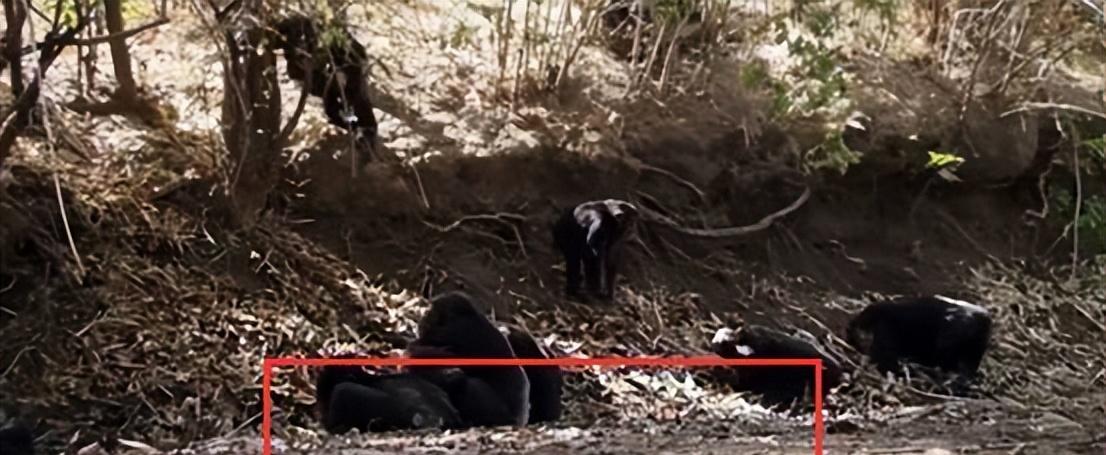According to the BBC in the United Kingdom, some researchers have found that a group of chimpanzees living in East Africa have learned to "dig wells for water", and through analysis, this group of East African chimpanzees has done so at least a few years ago.
Because this time, the chimpanzee tribe observed by the research team at the University of Kent in the United Kingdom, in 2015, once joined a new member from other chimpanzee tribes , an adult female chimpanzee.

And the first thing the female chimpanzee did after she arrived was to hand it over to the members of the new tribe to learn to "dig a well for water," which obviously meant that chimpanzees in her previous tribe would do the same.
At the same time, the researchers also found that before digging wells, chimpanzees will also sit sites, and will also filter the excavated "well water" and drink it, and they will also use tools made of stones, wood, etc., use them to work, or easily break open the hard food shell.
When the news came out, it quickly sparked heated discussion and discussion, and some people felt that this may indicate that chimpanzees have entered the "Paleolithic Age" and are evolving in the direction of intelligent organisms.
So, did the East African chimpanzees really enter the Stone Age?
From the perspective of human evolution, the sign that primitive humans entered the Paleolithic Age is that simple tools can be made through rock blocks, and simple nests can be built.
Chronologically speaking, the Paleolithic age began about 3 million years ago and ended 10,000 years ago, after which mankind entered the new era and it took only a few thousand years to open civilization.
It can be said that the entire evolutionary history of primitive humans has been accompanied by the continuous development of the Paleolithic Age, and in these 3 million years, primitive humans have also continued to progress.
However, these East African chimpanzees, who have learned to dig wells to draw water, are not actually into the Paleolithic Age, because they do not make stone tools, but just pick up the stones that are available for use and use them directly.
In addition, the study believes that the sign of the opening of the Paleolithic Age also includes "using fire", but at present, in addition to the chimpanzees that can use fire have been found in zoos, in the wild environment, chimpanzees that have not studied and learned to use fire have been discovered, so this also means that chimpanzees are still very far away from the Paleolithic Age.
So, research suggests that humans and chimpanzees come from the same ancestor, so why didn't they become human?
Speaking of which, many people question Darwin's theory of evolution as a "pseudoscience", one of the reasons is to wonder why it took millions of years for humans to give birth to civilization, but chimpanzees, which evolved at the same time as humans, still stay in their original form.
One reason is because, tens of millions of years ago, when the Great Rift Valley began to appear, the tropical rainforests of Africa began to become savannas, and at this time, the ancestors of human beings, some ancient apes, changed from arboreal to land-dwelling, although this transformation was extremely difficult at the time, but it was precisely because life was difficult that this group of ancient apes who dared to try would become the only wise people on the earth in continuous progress.
And when the rainforest receded and the ecological environment began to become harsh, the chimpanzee ancestors did not give up arboreal life, but continued to stay in a few forests, which also made them "satisfied with the status quo" and thus did not evolve in the direction of intelligent organisms, which made them and humans more and more distant on the road of evolution.
Another reason is that species evolution itself is also random, and some studies believe that in the process of ancient apes evolving toward humans, some genes mutated, thus giving them more intelligent brains and more powerful skills, which smoothly evolved into humans.
In addition, as early as the time of the great apes, they have been trying to get out of Africa, and after the official appearance of primitive humans, they have undergone many great migrations, but chimpanzees have been living in Africa, never tried to go out, and their populations have been decreasing, which has deprived them of the opportunity to become human.
Later, with the rise of human beings, human beings naturally will not allow another kind of "intelligent life" to appear on the earth and grab their own turf and resources, so the emergence of humans itself also limits the development of chimpanzees, so that even if they have the opportunity, they do not have the ability to evolve into a "new human race" in the human world.
Even because chimpanzees are at risk of extinction, including the next intelligent life on the earth after humans leave the earth, it is not necessarily evolved by chimpanzees, because the earth's ecological circle pays attention to the survival of the fittest, perhaps from millions of years ago, chimpanzees are destined to one day become "losers" in nature, friends, what do you think?